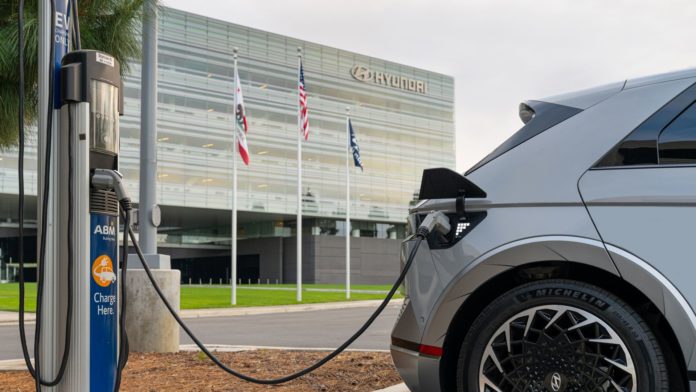Key Takeaways
- The Korean carmaker is still committed to bringing nearly two dozen EVs to market through Hyundai, Kia, and Genesis
- The pace of the rollout is likely to be stretched reflecting slowing sales growth
- Hyundai Megaplant in Georgia may be modified to produce hybrids and even gas models, as well as EVs
Few automakers have laid out more aggressive plans to conquer the global EV market than the Hyundai Motor Group. CEO Jaehoon Chang predicted his company will sell two million battery-electric vehicles annually by 2030. Based on industry-wide forecasts, that would position it as one of the three largest manufacturers of all-electric vehicles.
That strategy is now being reconsidered, however, as the growth in demand for all-electric models begins to slow. An internal study is now underway, and several senior officials have indicated it could lead Hyundai to slow the pace at which it rolls out new EVs following the success of its electric vehicles, including the Ioniq 5 and Ioniq 6. It may also lead to a major shift in plans for the Hyundai Metaplant America – a $7.6 billion assembly line and battery manufacturing complex in Bryan County, Georgia set to start production this coming October.
Adjusting Plans
“There is a place for EVs (but) we are adjusting” plans, Manish Mehotra, vice president of digital business planning and connected operations for Hyundai Motor North America, said during a media briefing in Nashville. “If we need to, we can slow down a bit here, add a little there,” he said, indicating this is the subject of a new internal study.
But that would be just a first step in adjusting to EV market demands, CarBuzz has learned. Several senior Hyundai officials, including Olabisi Boyle, senior vice president of product planning and mobility strategy for Hyundai Motor North America, told us that the new Metaplant may no longer be used as a dedicated EV production facility.

Related
Best Electric Cars of 2024
Automakers struggle to make sure their factories operate at a relatively steady pace. And to keep the Metaplant running at or near capacity could be difficult if EV sales don’t continue to grow as rapidly as they have over the last few years – jumping more than eightfold in the US between 2019 and 2023. As a result, Hyundai is considering revisions to the Bryan County, Georgia facility that would allow it to produce hybrids and even gas-powered vehicles until EV demand catches up.
The Hyundai Metaplant America facility is set to become HMG’s third US assembly plant, alongside the factory the Hyundai brand operates in Alabama, and a Kia factory in West Point, Georgia. It’s the biggest of the three, spread out over a 2,900-acre site.
Along with what was planned to be a dedicated EV line, the complex also includes a lithium-ion battery plant and other support operations. It is expected to employ as many as 8,500 workers when it gets fully up and running, with a capacity to produce as many as 300,000 battery-electric vehicles annually. Only a handful of EV facilities come close to that number, notably the Tesla Gigafactory in Fremont, California.
Originally expected to begin operations in January 2025, the Hyundai Metaplant will now launch production this coming October.
Automakers Pull Back on EVs
The slowdown in the EV market has been widely reported – though much of that coverage has been inaccurate. Demand is not falling. Sales of all-electric models fell just short of 1.2 million in the US last year, an all-time record. Most analysts, including those from S&P Global Mobility, Guidehouse Insights and J.D. Power, expect that to approach 1.5 million for all of 2024.
But the pace of growth is slowing to an estimated 25% this year. By comparison, the EV share of the U.S. market grew about 800% between 2019 and early 2023 before “flattening out,” said Tyson Jominy, Power’s head of data and analytics. He and other experts blame a variety of factors, notably including high EV prices, along with concerns about both range and the lack of a robust public charging network.
That’s leading a number of Hyundai’s competitors, including Volkswagen, General Motors and Ford, to adjust their own EV plans. Ford, for example, is delaying $11 billion in investments and putting a major new battery plant on hold. Even the Biden administration may adjust to market pressure. The White House is expected to revise rules announced by the EPA last year that would have required EVs to account for about 67% of all new US vehicle sales by 2032.




